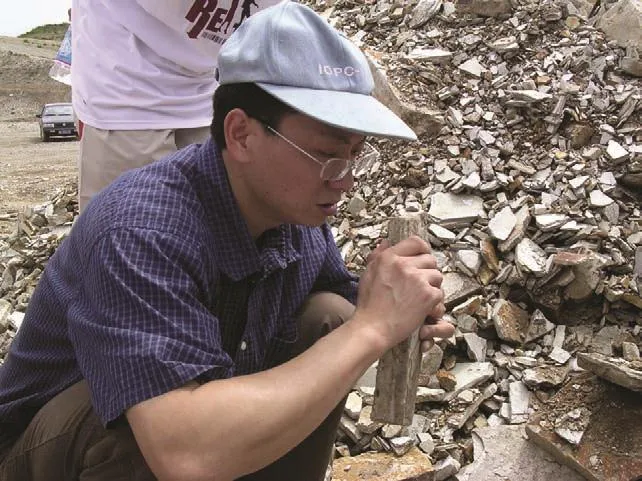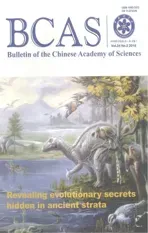Advances in Vertebrate Paleontology and Paleoanthropology in China
2010-12-30ZHOUZhongheandWANGYuanqing
ZHOU Zhonghe and WANG Yuanqing
Institute of Vertebrate Paleontology and Paleoanthropology, CAS, Beijing 100044, China
Vertebrate paleontology and paleoanthropology in China have a long glorious history dating back to the 1920s, and significant progress has been made in the last twenty years thanks to the discoveries of hundreds of important vertebrate fossils from the deposits ranging in age from the Early Cambrian to the Quaternary.These discoveries have led to nearly 100 papers appearing in prestigious journals of Nature, Science and PNAS by Chinese vertebrate paleontologists and paleoanthropologists,outnumbering those published by Chinese scientists from any other discipline in the same period.
Chinese paleoichthyologists have made remarkable contributions to the study of the origin of vertebrates,osteichthyes (bony fishes), sarcopterygians, and tetrapods by discovering some of the earliest fossil records in China.A comprehensive phylogenetic study of early vertebrates also provides insights into major character evolution in early vertebrate history.
Recently discovered Mesozoic amphibians in China have greatly increased our knowledge of early lissamphibian evolution.Discoveries of many basal and crown groups of frogs and salamanders from the Jehol Biota and earlier ages provided some critical information for studying their early evolution and differentiation.The detailed anatomy of several lizards has been studied and their living habits reconstructed.

Prof.ZHOU Zhonghe at field work.Zhou, who currently serves as Director of the CAS Institute of Vertebrate Paleontology and Paleoanthropology, was elected as a Foreign Associate of the National Academy of Sciences of USA on April 27, 2010, due to his contributions to the study of early avian evolution and the Jehol Biota.
The most remarkable discoveries made by Chinese vertebrate paleontologists include over ten different species of feathered dinosaurs from the late Jurassic to early Cretaceous that provided some of the most critical evidence supporting the dinosaurian origin of birds; and reconstruction of the habit of some theropod dinosaurs(including four-winged dinosaurs) confirmed the presence of arboreal dinosaurs, supporting the arboreal hypothesis of the bird f l ight as well as the old hypothesis that bird f l ight went through a four-winged stage.The Jehol dinosaur assemblage probably represents the best evidence for understanding the Early Cretaceous dinosaurian diversification.Major discoveries of dinosaurs also come from the Late Jurassic Xinjiang that produced the oldest known tyrannosauroid,among many others.Other important discoveries include dinosaur eggs and footprints from many new sites in various areas of China.
Discovery of the world’s first pterosaur embryo provides the first fossil evidence for pterosaurs’ laying eggs, concluding that pterosaurs had an embryological developmental mode similar to that of precocial birds.Furthermore, a comprehensive study of the Early Cretaceous pterosaur assemblage from Northeast China suggests that this area may represent an origin and diversification center for many Cretaceous pterosaur lineages.
In the last twenty years, over 30 new species of birds were reported from the Early Cretaceous of Northeast China, making it the most important area for the study of early avian evolution and having greatly improved our understanding of the morphological differentiation and ecological and evolutional radiation of early birds.The study on the world’s earliest bird embryo provided important information for studying the embryological developmental mode of early birds, lending further support for the hypothesis that the precocial embryological development occurred prior to altricial development.
Over ten different species of Early Cretaceous mammals have been reported including the earliest record of eutherians and metatherians, which has significantly improved our understanding of early mammalian radiation.The discovery of the ossified Meckle’s cartilage in mammals lends strong support for the character transformation related to definitive mammalian middle ears.The discovery of the first dinosaureating mammals documented the differentiation of diet and size in mammalian evolution in the Early Cretaceous.Discoveries of swimming and gliding Mesozoic mammals from the late Jurassic deposits have shown the locomotory and behavioral divergence of early mammals, which greatly predated the previous record of such mammalian behaviors.
Studies on Cenozoic mammals have also made remarkable progress in our understanding of the mammalian evolution and their paleoenvironmental background.Multidisciplinary approaches to the study of Cenozoic stratigraphy will likely result in the establishment of a standard Asian Mammalian Biochronology for multiregional correlations.
Chinese paleoanthropologists have also made a number of important discoveries, including the Nanjing Homo erectus fossils and many late Pleistocene Homo sapiens fossils, ranging approximately from 110 to 40 thousand years ago, from such localities as Tianyuandong of Choukoudian(Zhoukoudian) in suburban Beijing, Huanglongdong(Huanglong Cave) in Yunxi of Hubei Province, Lingjing in Xuchang of Hubei Province and Mulanshan in Chongzuo of Guangxi Autonomous Region.Chinese paleoanthropologists and paleolithic archaeologists have also provided fresh new evidence in support of the multiregional hypothesis of modern human origins.
The successes of Chinese vertebrate paleontology and paleoanthropology owe largely to the fast growing economy of the country and the appearance of a new generation of young and middle-aged vertebrate paleontologists who have now become the backbones of Chinese vertebrate paleontology.Some of these Chinese vertebrate paleontologists are now among the most active players in the international arena of their own research fields.
Despite the overall success of vertebrate paleontology and paleoanthropology in China, many challenges remain.More technology needs to be applied to current vertebrate paleontological studies, and more comprehensive and systematic studies of published materials are needed in order to develop new ideas and hypotheses.More academic exchanges among colleagues in various Chinese institutions are also necessary.
Illegal collecting and marketing of fossils remain detrimental to Chinese vertebrate paleontology today; on the other hand the lack of national laws governing the protection and scientific collecting of fossils and an efficient managing system is still a negative factor in Chinese vertebrate paleontological studies.
Finally, we expect to see the growth and expansion of the research and teaching of vertebrate paleontology in more colleges, museums, and institutions around the country.In addition, a national open laboratory in the area of vertebrate paleontology is highly desirable, and even essential, to guarantee the sustained development of this discipline in China.
杂志排行
Bulletin of the Chinese Academy of Sciences的其它文章
- Dinosaurs of a Feather
- The Origin and Diversification of Osteichthyans and Sarcopterygians:Rare Chinese Fossil Findings Advance Research on Key Issues of Evolution
- Amazing Reptile Fossils from the Marine Triassic of China
- Ongoing Research Projects at IVPP (A Selection)
- Recent Advances in Meso-Cenozoic Fish Research
- Dashankou Fauna: A Unique Window on the Early Evolution of Therapsids
